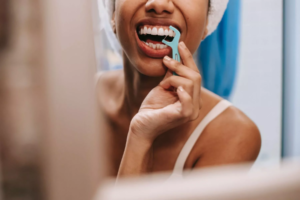Dental brushing is one of the most important practices for maintaining good dental health. Despite being a simple task, many people don’t know how to do it correctly, which can lead to dental and health problems in the future. In this article, you’ll learn everything you need to know about brushing to keep your teeth healthy and white.
Why is dental brushing important?
Dental brushing is essential because it helps remove bacterial plaque and food debris left on teeth and gums after eating. If these residues are not removed, they can cause cavities, gingivitis, and other dental and health problems. Additionally, regular brushing can prevent tartar buildup, which is a hard accumulation of bacterial plaque that may require professional cleaning.
How often should you brush your teeth?
It is recommended to brush your teeth at least twice a day, once in the morning and once before bedtime. If possible, you should also brush your teeth after each meal. However, it is essential to wait at least 30 minutes after eating before brushing your teeth, as the acid in the food can weaken tooth enamel, and brushing immediately afterwards can damage it.
How long should dental brushing last?
It is recommended to brush your teeth for at least two minutes each time you do it. This ensures you have enough time to clean all areas of the mouth properly.
What is the correct technique for dental brushing?
The correct technique is crucial for removing bacterial plaque and preventing dental problems. Follow these steps to brush your teeth correctly:
- Place the toothbrush against your teeth and gums at a 45-degree angle.
- Use circular and back-and-forth movements to gently brush your teeth and gums.
- Make sure to brush all tooth surfaces, including the outer, inner, and chewing surfaces.
- Gently brush your tongue and palate to remove bacteria and freshen your breath.
What type of toothbrush should I use?
Many toothbrush types are available on the market, but soft-bristled ones are most recommended. Hard bristles can damage tooth enamel and gums. You can also opt for electric toothbrushes, which are more effective at removing bacterial plaque.
Do I need to use dental floss in addition to brushing?
Yes, it is essential to use dental floss in addition to dental brushing. Brushing alone cannot effectively clean between teeth and gums, where bacterial plaque accumulates. Flossing at least once a day is vital for maintaining good oral hygiene.
Do I need to use mouthwash in addition to dental brushing?
Using mouthwash is not necessary but can be beneficial for oral health. Mouthwash can help remove bacteria in the mouth and freshen your breath. However, it is essential to choose an alcohol-free mouthwash, as alcohol can cause dry mouth and other dental issues.
What else can I do to maintain good oral hygiene besides dental brushing?
In addition to dental brushing, there are several things you can do to maintain good oral hygiene:
- Floss at least once a day to clean between teeth and gums.
- Limit the consumption of sugary foods and beverages, which can cause cavities.
- Visit the dentist regularly for check-ups and dental cleanings.
- Consider using additional products like tongue scrapers or oral irrigators for deeper cleaning.
Conclusion
Dental brushing is a crucial part of oral hygiene. By following the correct technique and brushing your teeth at least twice a day, you can prevent dental issues like cavities, gingivitis, and periodontal disease. Additionally, using dental floss and visiting the dentist regularly can help you maintain a healthy and radiant smile.
Frequently Asked Questions:
– Should I brush my teeth before or after breakfast?
It’s better to brush your teeth after breakfast, as waiting at least 30 minutes after eating can prevent damage to tooth enamel.
– What type of toothbrush is best for children?
For children, soft-bristled and small-sized toothbrushes are recommended, so they can effectively brush their teeth without damaging their gums.
– How can I choose the right mouthwash?
It’s essential to choose an alcohol-free mouthwash with the appropriate ingredients for your specific oral health needs. You can consult with your dentist for recommendations.
– How often should I visit the dentist?
It is recommended to visit the dentist at least twice a year for regular check-ups and dental cleanings.
– Are electric toothbrushes better than manual ones?
Electric toothbrushes can be more effective at removing bacterial plaque, but this doesn’t necessarily mean they are better than manual toothbrushes. It depends on personal preferences and individual needs.








